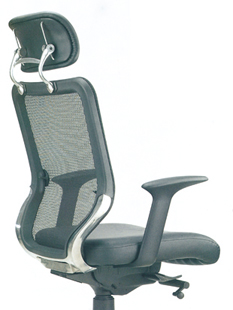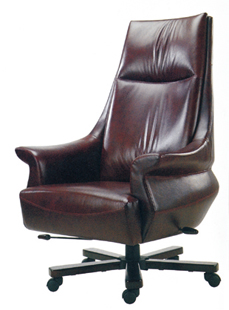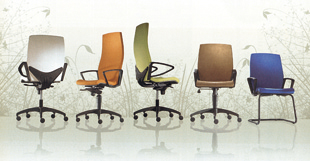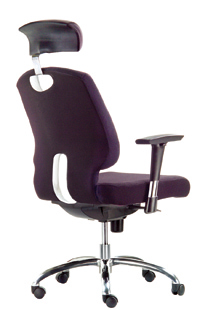Taiwan-based Office Chair Makers Rely on Timeless Ways of Success
2008/06/16 | By Judy LiThe reality-forced exodus of Taiwan-based furniture manufacturers over the past decade or two has inevitably sapped the momentum and magnitude from the local sector, especially volume produced wooden furnishings that call for intensive labor input and low labor costs are required. On the other hand, certain segments have retained strength in Taiwan, including metal and glass furniture, design-oriented furniture, eco-friendly furniture and office automation (OA) furniture, likely because such items generally require relative higher levels of technology, manufacturing standards, management science, and quality control, conditions that are not thought as widely available in emerging economies as China and Vietnam. One segment among furniture is OA furniture, while office chairs in particular have been helping Taiwan-based furniture makers to compete as significant suppliers in the field.
Today most OA furniture manufacturers in Taiwan focus on producing office chairs and their parts, successfully maintaining superiority in the sector by consistently delivering quality-assured products, a practice that enables the group to effectively carve out global niches. Actually a great number of OA furniture makers that have kept open operations in Taiwan have also set up overseas footholds, aiming to diversify manufacturing risk, with the majority of them having relocated to China.
Veteran Office Chair Maker
Kuo Ching Furniture Decoration Co. is one of Taiwan's leading OA furniture makers who has been in the line for some three decades, generating mainly office chairs as well as having diversified into other lines as sofas, lounge chairs and children's furniture in recent year.

The company, established in 1979, has been faithful to its corporate philosophy of "creating the best products for clients," realizing such belief by building its operations on a solid foundation of high industrial technology, advanced know-how, professionalism, and operating management science.
Design as Soul
"Design is the soul of a product," says Edward Chang, director of design of the company. "A designer has to consider every aspect of a product when planning its design. For instance, a designer has to first decide on the kind of materials to be used when designing an office chair, its size, color, and application or typical user while drafting out the sketches."
"An effective designer needs not only to be gifted with esthetic sense and creativity, but also broad knowledge of different sciences enabling foresight, multi-angled view. In other words, a designer is the soul that foresees, predicts and evaluates what must make up a product for optimized function, appeal and preferably marketability. No wonder it is generally accepted that a well-designed product needs minimal marketing as it usually sells itself. So, design is a decisive factor in virtually any industry today," Chang emphasizes.
Chang points out the considerable changes that office chairs have undergone in recent years in terms of material and design. In the early days, office chairs reflected class-based mindsets in corporate culture, where chairs were mostly of wood, foam, leather or synthetic leather, with fancier design and thick seat cushions for executives and high-ranking officials and simpler designs and thinner cushions for lower-echelon staff. Ergonomics as science was generally not part of furniture design previously, while "Today many office chairs feature ergonomic designs with ventilated mesh backs in addition to height-adjustable seats and arm rests, as well as caster-installed feet," Chang says. "Currently some office chair makers are trying to use industrial plastics as the predominant ingredient to enable injection fabrication-specifically integrating into a single unit the back and seat."
"Industrial plastics are now widely used, allowing higher design flexibility, easier cleaning, etc. Perhaps more importantly such materials enable single-unit injection as described above to reduce labor and manufacturing costs. Nowadays public furniture is increasingly made of such material," Chang adds.
Bi-coastal Operation
Today Kuo Ching runs six plants, one in Taiwan and five in China, with the Taiwan-based plant focusing on the domestic market and also supplying high-end parts to the plants in China, which turn out most of the company's products. Two of the five China plants are in Guangdong Province, which are export-oriented, while the other three are in Shanghai, Beijing and Sichuan Province, which focus on the local markets.

The company employs more than 2,000 workers in both Taiwan and China who turn out around 200-300 containerfuls of products monthly, which are shipped globally, mainly to the United States, Canada, Australia, Japan, the Middle East and Europe.
To further upgrade quality, Kuo Ching is working with a prestigious Italian office- furniture parts maker, who supplies key parts in return. Besides, the company is planning to establish an independent R&D center in Taiwan, with the projected center to be in charge of designing and developing new parts for plants in both Taiwan and China, as well as helping train R&D talents in China.
Product Diversification
About three or four years ago, the company expanded product lines to include items for living rooms, studies and romper rooms. "To increase facilities utilization, we have to produce wider range of furniture, which also helps to diversify product lines to better meet demands. In the future, we will surely focus more on developing eco-friendly and health-enhancing furniture to be more socially conscious, as well as help protect the earth as well," Chang says.
Dynamic Office Chair Maker
Strong Lift Co., established in 2004, is a young and dynamic manufacturer of office chairs and turns out mainly middle and high-end chairs in its plants in South Africa, China and Taiwan. "Actually our major factory is in South Africa because my younger brother and I immigrated to South Africa about 15 years ago, and started our careers by running a restaurant and then branching out into foreign trade," states Paul Hou, chairman of the company. "We began engaging in the furniture sector only about four years ago to make mainly office chairs."
"We also run a small plant in Taiwan that turns out high-end parts for the plants in South Africa and China. Besides, our Taiwan operations also handle marketing research, purchasing and produces relatively small volumes of office chairs for the domestic market," Hou says. "We run our own office in China, working with several Taiwanese office chair makers there to turn out chairs on OEM basis for both local and overseas clients."

"With our major manufacturing operations in South Africa, we therefore focus on the African and European markets as well," Hou discloses. "To better serve the taste of European buyers, we have a strong R&D team of Europeans, with most being British. Currently our South African plant exports about 30% of its output to Europe and the remaining 70% are distributed throughout South Africa and other African countries. To effectively meet demands in both Africa and Europe, we have a large warehouse in South Africa bigger than 10,000 square meters."
Reality-forced Strategy
"Current soaring manufacturing costs in both Taiwan and China are forcing us to firmly keep running our South African operations, despite widely reported decline in social order there," Hou laments. "However we still see potential niches in Europe and other parts of Africa, so our R&D technicians are developing unique, high-end office chairs to target upscale consumers there."
"Our operations in South Africa, Taiwan and China are complementary. Being able to efficiently operate in these three areas enable us to remain strong and retain profitable niches globally," Hou says confidently.
Selling Ideas and Designs
Established in 1999, Camel King is a leading, specialized office chair manufacturer in Taiwan that continues to be loyal to focusing on R&D, a strategy that has enabled the supplier to successfully tap the high-end office chair segment, both at home and abroad.
Alex Wang, founder and president of the company, stresses that R&D is pivotal to the successful marketing of a product. "We sell not merely the chair, but also the design and idea. We offer convenient, comfortable, and ergonomic chairs, with unique and stylish designs," Wang says proudly.

Wang discloses that he entered the furniture sector in 1981 when it approached its peak. In the beginning of his furniture career, Wang worked in the R&D department of UB Office System, Taiwan's pioneer office furniture maker and also one of the furniture giants on the island at the time.
After cutting his teeth and accumulating sound and strict training, experience at UB Office, Wang felt confident enough to start running his own operations. To start up, Wang worked as an ODM supplier of office chairs for leading local furniture companies, and then gradually began to explore overseas markets. "The past two decades have seen Taiwan's furniture sector on a roller coaster, with many of our peers moving production to China to reduce manufacturing costs, but we have stood firm to stay put," he notes.
Camel King's dedicated R&D program has not only allowed the firm to be ISO approved, but also making the firm a regular award winner both at home and abroad-for offering product excellence. One such honor is the "NeoCon Gold Award," the highest of those given out at the annual Best of NeoCon Awards, which are some of the most coveted design awards worldwide.
High-tech Materials
Most of the company's high-end office chairs are made of specially-developed high-tech materials: for instance, the cushions are of MemoSorb, a "smart" memory foam that absorbs humidity and heat while relieving pressure on the user's contact areas via decompression without significant rebound. The covers on the cushion is of a knitted nylon mesh that allows ventilation to help dissipate body-heat especially after prolonged sitting.
The backs on Camel King's chairs feature ergonomic design-a lumbar-conforming curve-to enable even support of the lower back and waist while sitting. Plus the head rest features lab-tested softness, curvature and height adjustment to enable proper support of head and neck-hence optimizing the long-term comfort of sitting.
"Today global design trends tend to revolve around simplicity, natural style and eco-friendliness," Wang remarks. "Chair design should be simple and yet be multifunctional, which sounds paradoxical; but advanced high technology nowadays can actually help us realize such chairs."
Camel King never stops to improve itself, choosing in recent years to transform itself into a manufacturing service company from merely a manufacturer. "We offer much more than just finished products. For instance, we export parts and necessary facilities and teach clients product assembly, which is a kind of export turn-key service," Wang explains. "Now the company can offer technology transfer, logistics, and sourcing, in addition to user-ready products."
"Furniture manufacturers that stay in Taiwan should aim to turn out high-end products and develop know-how to find their own market niches. The only way for them to survive globally is to focus more on R&D to develop value-added, innovative products," Wang suggests.




